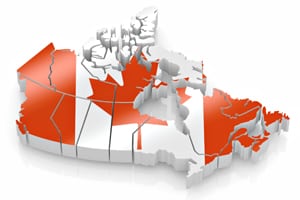 Canada is a prime market for merchants to access, with an estimated 2013 GDP of $1.52 trillion. Other sources, including the Luxembourg Income Study Database, indicate the after-tax median income in Canada is now higher than the U.S.
Canada is a prime market for merchants to access, with an estimated 2013 GDP of $1.52 trillion. Other sources, including the Luxembourg Income Study Database, indicate the after-tax median income in Canada is now higher than the U.S.
For marketers, Canada represents a new and lucrative opportunity. However, for companies unfamiliar with the intricacies of Canadian regulation, the transition can seem confusing and costly.
The Canadian market has significantly more regulations than the U.S. for products marketed to consumers. Extensive regulations can result in time-consuming limitations that affect a company’s ability to sell their product in Canada.
Given the scope of the initiative, you should develop an experienced team to best prepare for a Canadian launch. Whether you’re an international company or a Canadian-based merchant, customer satisfaction still leads to brand loyalty and long-term customer value.
Utilizing experts in logistics, fulfillment, distribution and other specialties will streamline the process. As the business owner, director of operations or marketer, you don’t have to become an expert in international logistics when your partner understands the potential challenges of an international launch and how to best mitigate them.
Common problems when attempting to ship to Canada without proper guidance or expertise:
- Slow delivery time without tracking
- Significant cost for any sort of expedited service
- Surprise customer charges such as duties or sales taxes, which can result in cancelled orders or no reorders.
- Limitations on the quantity of goods Health Canada will allow into the country – for example, companies cannot ship more than 90 days’ worth of inventory to any one customer.
- Average product delivery time is two weeks without a tracking code – meaning a disaster for trial offers.
- Risk of rejected shipments due to non-compliance with Health Canada policies.
- Only Health Canada-approved products are allowed entry across the border in bulk shipments.
The Solution: Choose a partner that understands the intricacies of the Canadian marketplace to handle turnkey logistics. Here are some questions to ask yourself before establishing a partnership.
- What is the average delivery time for an order?
- Does the company provide tracking information for a customer’s order?
- Does the company provide expedited service at a reasonable cost?
- Does the company pick up your inventory in the U.S. and deliver it to their Canadian facility or your customers?
- Does the company handle customs clearance and brokerage into Canada?
- Does the company offer storage and pick and pack?
- For products in the health category, does the company have a Health Canada site licensed facility to receive and store inventory, or approved licenses in all major product categories?
By reviewing these factors, you can proactively assess the potential pitfalls of a Canadian launch, like shipping delays, Health Canada rejections or surprise sales tax fees and duties – all of which can lead to disgruntled customers. This will ensure you’re set up in the most efficient and cost-effective manner to ensure a smooth product delivery to Canadian customers.
Steven Page is president of Canadian distribution and logistics provider Stalco Inc.